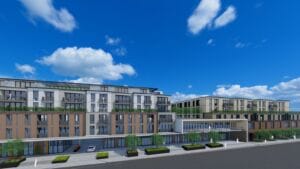Despite reports that construction of new senior living is sluggish in some parts of the U.S., the HUD Lean program experienced growth this year. HUD recently released its 2019 fiscal year-end data showing $3.7 billion in loan volume, up from $3.6 million last year. The average loan size was $13 million, which set a new record for the HUD Lean program. Cambridge Realty Capital founder Jeffrey Davis is not surprised. “Our experience at Cambridge this year has been similar,” he stated.
This news is encouraging in the wake of a fluctuating new construction market. However, Davis points out the need for perspective. “New construction has slowed in some areas, but grown in others, particularly in major urban areas,” Davis stated. In September, Senior Housing News released numbers for the top ten markets for new senior living construction based on the analysis of data provided by the National Investment Center for Seniors Housing & Care (NIC). The data reflects the number of units under construction at the time the data was collected. New York held the top spot with 3,768 units being built. Chicago landed fifth on the list with 2,568 units under construction. Other cities on the list were Dallas-Ft. Worth, Atlanta, Philadelphia, Phoenix, Washington, D.C., Los Angeles, Minneapolis, and Houston. (Read the full Senior Living News story here: https://seniorhousingnews.com/2019/09/20/these-are-senior-housings-top-10-major-construction-markets/).
While bed and unit vacancies are plaguing some areas, some senior living operators are counting this as the cost of doing business. They are looking toward the peak of the “Silver Tsunami,” when the largest segment of baby boomers come of age and will be requiring some type of alternative living or living and healthcare combination. Many of these very cities which are senior living construction hotbeds today are going to be high-demand areas in over the next several years.
In spite of sluggish growth in some rural areas and smaller cities, the data provided by HUD is a positive indicator of the health of the senior living industry in general. “Growth is happening, new construction is happening,” Davis said, adding “HUD funding remains not only a popular source of funding for senior living developers, but it is also the ‘go-to program’ for the skilled nursing facility in particular.” In an interview with Skilled Nursing News earlier this year, Davis iterated, “The popularity of the program is terrific and also socially relevant, as with SNF buildings, HUD is servicing both an elderly and financially needy population.”
With benefits like low-interest rates (typically between 3.5% and 5.5%), terms of up to 40 years and no personal recourse, the HUD 232 program continues to be highly attractive to senior living developers, owners, and operators. Davis urges senior living developers and operators who are currently examining their capital options or are already sold on the idea of a HUD 232 loan to contact Cambridge Realty Capital for more information. “Cambridge Realty Capital has closed more than 550 HUD loans worth more than $5.5 billion.” Cambridge can quickly assess a potential borrower’s qualifications as well as help them identify any gaps in documentation or services that might hold up the process. In most cases, Cambridge Realty Capital is able to close a HUD loan faster than the average wait time.”
Privately owned since 1983, Cambridge today has three distinct business units: FHA-insured HUD loans, conventional financing, and investments and acquisitions. The company is one of the nation’s leading specialized senior housing and healthcare debt and equity capital providers, with more than 550 closed senior housing transactions totaling more than $5.5 billion.
Cambridge has consistently ranked among the country’s top ten FHA-insured HUD lenders over the last 15 years and offers an array of conventional lending options, including permanent construction and interim loans on either a floating or variable rate basis. The company’s principal investment strategy includes direct property acquisitions, joint ventures, and sale/leasebacks. The company has acquired 16 facilities totaling approximately $60 million. Cambridge has a national origination office in Los Angeles, and numerous correspondent and brokerage relationships nationwide. Additional information is available on the Cambridge website, www.cambridgecap.com.



